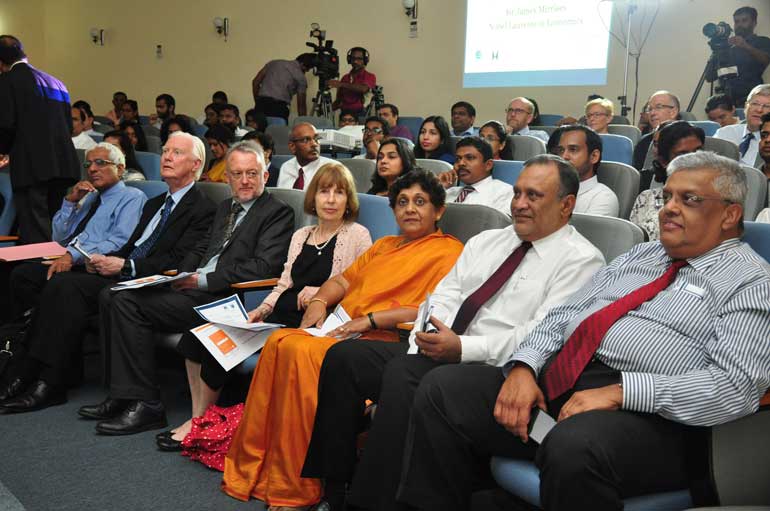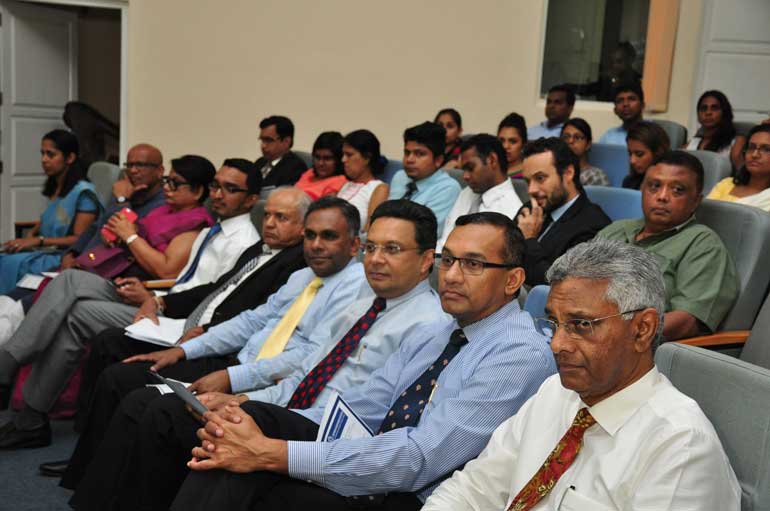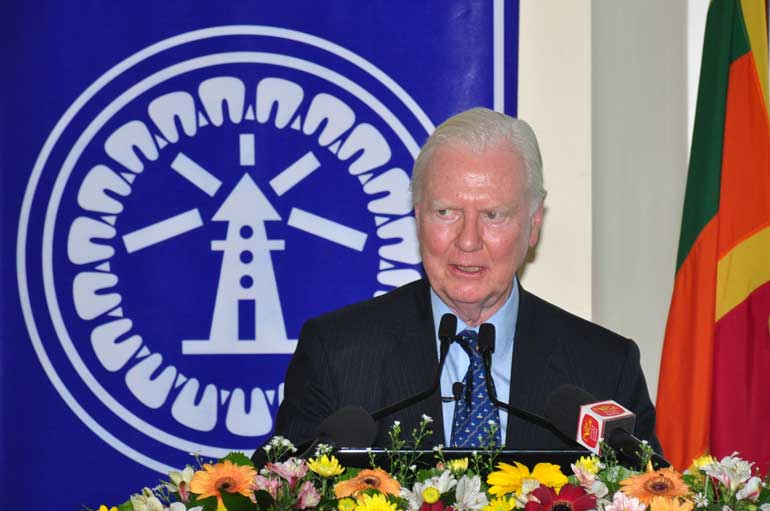Thursday Feb 19, 2026
Thursday Feb 19, 2026
Thursday, 24 March 2016 00:00 - - {{hitsCtrl.values.hits}}



Economist and Nobel laureate Sir James Mirrlees
While Sri Lanka has made some progress with regard to going green, careful consideration needs to be made when it comes to increased urbanisation, renowned economist and Nobel laureate Sir James Mirrlees said.
Speaking at a dialogue on sustainable development held at the Lakshman Kadirgamar institute last month, Sir Mirrlees said that Sri Lanka, as a signatory to the Paris agreement on climate change, has already made plans to move over to greener means of producing energy, but needs to look at ways of countering rising temperatures as a result of global warming.
An obvious solution island nations can adapt, he said, is to move people away from coastal areas.
“Sri Lanka is notable as a country whose boundaries are all sea coast. The mean estimate within a very wide range of possibilities is that, at the end of this century, sea level will on average have risen by about two thirds of a metre, which should be enough to cause a great deal of trouble for a country that still remembers the tsunami,” he said.
When compared to other Asian countries, Sri Lanka had lower emissions, said Sir Mirrlees, adding that the country has an unusually low urbanisation, growing forests and plentiful fresh water. However, he said, major plans are underway to increase urbanisation - which is understandable, he added - and caution must be exercised in order to keep things environmentally friendly. Benefits and costs need to be assessed, he said, suggesting that the future was in developing a number of smaller cities.
Sri Lanka is attempting to reduce generation of electricity from fossil fuels, and green alternatives such as electric vehicles need to be made more accessible
Sustainable development, as its widely accepted definition states, is development that meets the needs of the present without compromising the ability of future generations to meet their own needs. The goal, then, of sustainable development, said Sir Mirrlees, should be to guarantee that future generations will be at as well off as the present or better.
“It’s really hard to guarantee it. Once you put it that way, it almost instantly reminds you that whatever you do now, the results are going to be a bit uncertain, [when you’re looking at 30 or so years into the future]. A lot of things can happen in between. Are we supposed to guarantee that our children and our grandchildren will be at least as well off as we are ourselves? At least to a minimum standard,” he said.
The sustainable development goals have a long list of what would be good to have, but not often very clear.
“An underlying assumption here is that the aims - it’s not just economic policy - should be a long list of things to be achieved. Does that mean when you achieve them, you’re done?
With regard to climate change, he said there several obvious ways of dealing with carbon gas emissions. One is to make people liable for the future harm that they cause by introducing a bill of rights and the idea that compensation must be paid to affected parties - for example, citizens of a submerged island. While it’s not at all realistic to expect everyone who has been contributing to global warming by burning fossil fuels to pay up, it might still be a good way to think about its cost.
Then there is the possibility of making those responsible for emissions pay a tax. Or, said Sir Mirrlees, have a treaty among nations where they all agree to do something - something that includes carbon taxes, subsidies for research into global warming and introducing policies that ensure no nation is worse off.
There is a third possibility, he said, which is an ambitious effort to achieve a common temperature goal, to be two-degrees above Celsius pre industrial temperatures
“A lot of difficulties about that goal. A single goal with a lot of different people contributing to achieving it without any way in coordinating one another’s behaviour. Another difficulty is it’s not clear what average overtime is meant by this, since we know temperatures fluctuate a great deal,” he said.
Pix by Lasantha Kumara